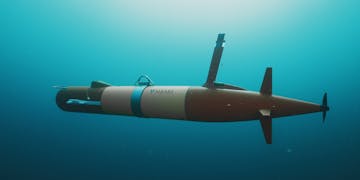Underwater robotics have been critical for ocean exploration. Self-guided autonomous underwater vehicles, or AUVs, can generate incredibly detailed, high-resolution maps of the deep seafloor, sample drifting bits of genetic material to understand marine biodiversity, and even track an animal as it moves about the midwater.
However, many are still too expensive to build and operate. MBARI scientists have access to cutting-edge robotics developed and maintained by our engineering team, but other scientists are not as fortunate. Ocean exploration and discovery too often remain out of reach for many individuals and organizations with limited resources. Lowering barriers is vital, especially for problems requiring high-resolution information across large spatial or temporal scales.
In 2022, MBARI welcomed new Principal Engineer Giancarlo Troni, who will lead MBARI’s newly formed marine robotics lab: Control, Modelling, Perception for Autonomous Systems (CoMPAS).
The initial work for the CoMPAS Lab will be to enable exploration without having previous knowledge of an environment.
Currently, MBARI deploys its mapping AUV to build high-resolution maps of the seafloor, but these efforts build on existing low-resolution maps of the seafloor. We are also limited to less complex terrains and, depending on the resolution, to smaller spatial and temporal scales for mapping. Our mapping efforts must follow a predefined plan executed by a single vehicle at a time. Can multiple autonomous vehicles survey previously unexplored complex terrain? Can they complete repeated mapping missions to resolve changes over time? Can these systems be applied to tracking and targeted sampling in the midwater?
The CoMPAS Lab will focus on three elements of autonomy for marine robotic platforms to enable multi-vehicle operations—focusing on precision navigation, accurate control, and scalable platforms. Simultaneous localization and mapping, or SLAM, computing is frequently used to map terrestrial terrain as a vehicle moves in or above an environment. CoMPAS will work to adapt these navigation algorithms for underwater environments. Most underwater vehicles have a restricted range of movement, so the CoMPAS Lab will explore how to implement advanced control and perception algorithms to analyze complex environments.
The lab’s ultimate goal is to develop and transfer technology for making ocean exploration more accessible. By investing in scalable—small, low-cost, and low-power—systems, we can distribute the tools and expertise for others to join in ocean exploration. Ultimately, Troni’s team seeks to expand the community engaged in ocean research—many hands will make light work to help us answer the questions still outstanding about our planet.
